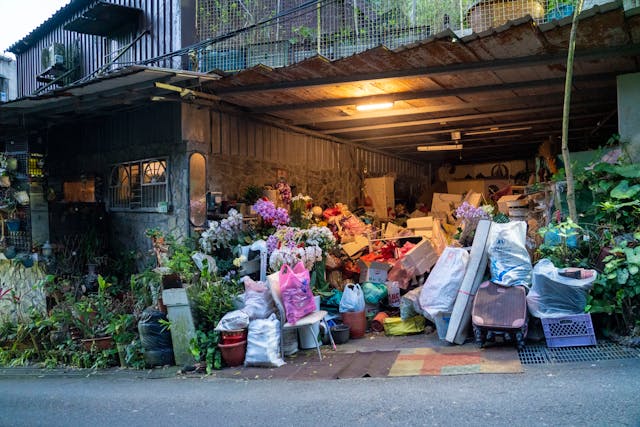
Why do people hoard? There is no one reason why someone becomes a hoarder and sometimes the reasons are not known at all. Let’s take a look at a few of the reasons that could apply to a hoarder.
As with most things, there are different levels of hoarding. Somebody who keeps more than they should is not necessarily a hoarder. It becomes hoarding, and what is known as hoarding disorder, when it starts to impact on your daily life. If it reaches this point, it is a psychological problem, akin to an addiction. That is actually one way that a lot of psychological disorders are assessed. If the disorder is beginning to have an impact on your life, it has become a disorder rather than just a habit or a quirk. Alcohol is a good example. Having a few drinks isn’t a problem. Getting drunk every now and again is also not a problem. When it starts to impinge on your daily life, it is a problem.
There are several questions you can ask yourself if you want to know whether your addiction, be it hoarding or alcohol, has become a problem. Do you lose time because of it? Is it making your home life unhappy? Is it affecting your reputation? Do you feel remorse because of it? Do you have trouble letting things go? Do you suffer from obsessive thoughts about the things you keep? Do you suffer from anxiety? Do you have trouble with everyday tasks? Obviously, not every question will apply to every person who hoards, but it is a good starting point.
So, what is a hoarder? A hoarder is someone who has trouble getting rid of things because of a need to save them. If they are forced to part with their possessions, it can cause them extreme stress. The clutter that they live in can disrupt their lives. There is something that we need to get clear. Hoarders are not the same as simply messy people. If you have a very messy house, you can clean it if the incentive or the help is there. Hoarders cannot clean because to do so causes them great distress. To get over hoarding, people need professional mental health counseling.
Hoarding is divided into levels from 1 to 5. A level one hoarder has some difficulty parting with things they no longer need, but they can still use their rooms. The may shop excessively and buy things they don’t need, which they then can’t get rid of. Level 2 is a little worse than 1 and it starts to become a problem. Level 2 hoarders also start to get defensive. There is a lot of trash and pests start to appear. At level 3, there are a lot of pests, bad odors, some unusable rooms, and a possible danger, which the hoarder downplays when confronted. Tidying is no longer possible. At level 4 there are many unusable rooms and possibly problems with sewage. There are bad smells, lots of trash, and rotting food. There may be structural damage. The hoarder won’t have bathed because they cannot use their bath and the water may have been turned off. Level 5 is the worst. Much of the house is inaccessible and it is a fire hazard. There is a buildup of waste, both human and animal. There will be a pathway through the hoard to the hoarders nest area. The hoarder will be in denial.
So, what causes it? There are several possible causes that vary from person to person. It could be down to trying to deal with difficult feelings and anxiety. Collecting and keeping things gives the hoarder a sense of control over one are of their life, which helps them feel safer in other areas. They may also have impulse control and cannot stop themselves buying things. Hoarders may also be perfectionists. It might be difficult to think that when you see one of their homes, but often perfectionists are the messiest people and the worst procrastinators because they are so scared that things won’t be perfect they don’t start, or don’t clean. A perfectionist also dreads getting in trouble and they might worry that they could throw something away they later need. They could be trying to cope with childhood experiences of loss. If they grew up poor, they might have a belief that they need to keep everything. Or they could be trying to overcome trauma or loss of a loved one. It could also have been passed down from a parent. If you grew up in a house with a hoarder, the chances are higher that you will become one. Although, a lot of hoarders do live on their own, so they might not have children. It could also be a form of Obsessive Compulsive Disorder, such as over washing the hands. The hoarder can’t stop themselves because of an irrational fear that something bad will happen if they throw things away. If you are in this position or you know someone who is, you can find help. And this is what I learned today.
Try these:
Sources
https://www.mayoclinic.org/diseases-conditions/hoarding-disorder/symptoms-causes/syc-20356056
https://www.psychiatry.org/patients-families/hoarding-disorder/what-is-hoarding-disorder
https://www.stonybrook.edu/commcms/studentaffairs/cpo/substances/aa_questions
https://iocdf.org/wp-content/uploads/2014/10/Hoarding-Fact-Sheet.pdf
Photo by Jimmy Liao: https://www.pexels.com/photo/plants-and-bags-in-garage-15828484/
